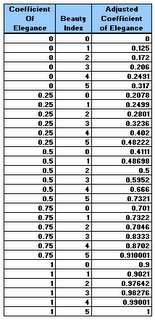Elegant Slacker Newsletter v.7
Elegant Slacker Magazine...keep on keepin' on!
Our research center has been delving into the details of the key value for calculating Earned Slack Value, the Coefficient of Elegance, and come up with some remarkable findings, which we present to you in this issue. Our weekly vocabulary enhancers make their appearance and a new time killer to help pass your days and nights will surely stimulate even the least elegant slacker. Sit back, relax and enjoy the slack.
Elegant Slacker Vocabulary Words for the Week
Word 1: ontology (noun); ontological (adjective); ontologically (adverb)
Meaning: [we have no clue what this word means and highly doubt anyone else does either, ed.]
Example usage (n): We need to come up with a new ontology for our business. I am going to take the ontology out for a walk. My ontology will be more effective after lunch. Stop being such an ontology.
Example usage (adj): The ontological implications of what you suggest are mammoth. Stop being so ontological.
Example usage (adv): Speaking ontologically, the sales figures from last quarter weren't that bad.
Notes: Just use this word. No one will have the audacity to ask you what it means, but no one will actually be able to give you a firm definition of what it means. If challenged, simply bounce the question back at any foes, "Well, of course it depends on how you define it. How would you define it?" Word 2: kickoff (noun); kickoff (verb)
Meaning (n): the beginning, start or initial encounter
Meaning (v): to begin, start or initially encounter
Example usage (n): The kickoff was a great source of enthusiasm for the team as we embark on our new endeavors.
Example usage (v): We will kickoff the new project with little fanfare and many sweaty brows.
Notes: "Kickoff," in its noun form, typically refers to some sort of gathering. It is possible to have a kickoff without ever actually having a gathering. Simply passing coworkers and greeting them can be construed as a kickoff [to work]. Kickoffs also can be used to mark even the smallest beginnings, even a simple kickoff to your day is appropriate and, when coupled with meetings and such, can lead to much time killed in a ES-friendly fashion.
Elegant Slacker Feature of the Week
"Adjusted Coefficient of Elegance" Several weeks ago, Elegant Slacker Laborites Inc presented in this publication, a calculator for determining one's Earned Slack Value. Since then, our mail bags have been filled with inquiries on the value and importance of the Coefficient of Elegance. Our research facilities have taken your comments, criticisms, and crumpets and drilled down into some details on this mysterious multiplier. The History
The Coefficient of Elegance was first conceived by Sir Fredriecht Nottendoer around the turn of the century. He identified the coefficient while attempting to quantify his role as a knighted individual and why he was neither asked nor compelled to perform any noble works typically associated with his royally anointed brethren. Since then, the coefficient has been used around the world by elegant slack researchers to indicate a relative elegance, and most recently in the calculation of Earned Slack Value. The Dilemma
For many years, the coefficient's importance has been disputed in the ES world. The problem was first formally presented in another of Nottendoer's studies. Nottendoer was the proud father of 2 children, Greta and Gregor, whom he tried to groom in his elegant slacking ways. Both were elegant slackers, but for some reason, one was much more beautiful than the other and this seemed to affect their ability to slack elegantly. Both had equally high coefficients of elegance, but the siblings did not seem to be equal.
A Solution?
To this day there has not been nor will there be a resolution to this dilemma which resurfaces time and again throughout history. In spite of the seeming futility of continuing to solve this puzzle, our researchers have to continue to march towards a possible solution or at least to document paths that do not work. Below is a table which was published in last month's Quarterly Quasi-Review of Partially Complete Research in Slack and Elegance presenting a new Adjusted Coefficient of Elegance which takes into account a beauty index. When applying the adjusted coefficient of elegance to the original equation (see below) used by Nottendoer, we see that Greta, who was slightly more attractive than Gregor, was actually a better elegant slacker due to her beauty.
When applying the adjusted coefficient of elegance to the original equation (see below) used by Nottendoer, we see that Greta, who was slightly more attractive than Gregor, was actually a better elegant slacker due to her beauty.
 The Future
The Future
We encourage all elegant slackers to take heed of our ground breaking work and perhaps one day it will create a significant ripple in the world of elegant slacking. For now, we hope to simply present the issues to allow others to iterate on the problem and perhaps develop ontologies that will assist future generations and help them understand the complex relationship between beauty and elegant slacking.
Elegant Slacker Weekly Time Killer
"Start an Online Newsletter" In today's information age, it is important to stay abreast of all the latest happenings in your chosen field. It is also important to communicate this knowledge with other co-workers and superiors. With this in mind, ES presents the "Start an Online Newsletter" time killer. You might think that you have nothing interesting to say, but in actuality, you don't need to say anything in your blog. Some of the most popular weblogs are simply compendiums of interesting things the author found on someone else's site. Simply cite, link and enjoy your new expert status label. 1. Open an account with any one of the free Internet blogging services
2. Choose a clever, yet elegant name for your blog. (e.g. "Active Accountants" or "Weekly [your topic here] Review") 3. Select a sedate, professional template for your blog. (example)
4. Spend as much time as needed to find interesting, provocative web sites that contain the office's buzz words of the moment
5. Post each "hit" as its own entry. Be sure to adjust the date of posting to reflect a posting time after normal working hours or weekend hours. This initiative taking will be viewed positively in certain circles.
6. Don't post all in one day, reserve your material for when times are tough, slow or you are just too in your slack zone to look for new material.
7. Email link to your co-workers, boss, etc. to garner recognition for your efforts.
Meaning: [we have no clue what this word means and highly doubt anyone else does either, ed.]
Example usage (n): We need to come up with a new ontology for our business. I am going to take the ontology out for a walk. My ontology will be more effective after lunch. Stop being such an ontology.
Example usage (adj): The ontological implications of what you suggest are mammoth. Stop being so ontological.
Example usage (adv): Speaking ontologically, the sales figures from last quarter weren't that bad.
Notes: Just use this word. No one will have the audacity to ask you what it means, but no one will actually be able to give you a firm definition of what it means. If challenged, simply bounce the question back at any foes, "Well, of course it depends on how you define it. How would you define it?" Word 2: kickoff (noun); kickoff (verb)
Meaning (n): the beginning, start or initial encounter
Meaning (v): to begin, start or initially encounter
Example usage (n): The kickoff was a great source of enthusiasm for the team as we embark on our new endeavors.
Example usage (v): We will kickoff the new project with little fanfare and many sweaty brows.
Notes: "Kickoff," in its noun form, typically refers to some sort of gathering. It is possible to have a kickoff without ever actually having a gathering. Simply passing coworkers and greeting them can be construed as a kickoff [to work]. Kickoffs also can be used to mark even the smallest beginnings, even a simple kickoff to your day is appropriate and, when coupled with meetings and such, can lead to much time killed in a ES-friendly fashion.
"Adjusted Coefficient of Elegance" Several weeks ago, Elegant Slacker Laborites Inc presented in this publication, a calculator for determining one's Earned Slack Value. Since then, our mail bags have been filled with inquiries on the value and importance of the Coefficient of Elegance. Our research facilities have taken your comments, criticisms, and crumpets and drilled down into some details on this mysterious multiplier. The History
The Coefficient of Elegance was first conceived by Sir Fredriecht Nottendoer around the turn of the century. He identified the coefficient while attempting to quantify his role as a knighted individual and why he was neither asked nor compelled to perform any noble works typically associated with his royally anointed brethren. Since then, the coefficient has been used around the world by elegant slack researchers to indicate a relative elegance, and most recently in the calculation of Earned Slack Value. The Dilemma
For many years, the coefficient's importance has been disputed in the ES world. The problem was first formally presented in another of Nottendoer's studies. Nottendoer was the proud father of 2 children, Greta and Gregor, whom he tried to groom in his elegant slacking ways. Both were elegant slackers, but for some reason, one was much more beautiful than the other and this seemed to affect their ability to slack elegantly. Both had equally high coefficients of elegance, but the siblings did not seem to be equal.

| 
|
To this day there has not been nor will there be a resolution to this dilemma which resurfaces time and again throughout history. In spite of the seeming futility of continuing to solve this puzzle, our researchers have to continue to march towards a possible solution or at least to document paths that do not work. Below is a table which was published in last month's Quarterly Quasi-Review of Partially Complete Research in Slack and Elegance presenting a new Adjusted Coefficient of Elegance which takes into account a beauty index.
 When applying the adjusted coefficient of elegance to the original equation (see below) used by Nottendoer, we see that Greta, who was slightly more attractive than Gregor, was actually a better elegant slacker due to her beauty.
When applying the adjusted coefficient of elegance to the original equation (see below) used by Nottendoer, we see that Greta, who was slightly more attractive than Gregor, was actually a better elegant slacker due to her beauty.
 The Future
The FutureWe encourage all elegant slackers to take heed of our ground breaking work and perhaps one day it will create a significant ripple in the world of elegant slacking. For now, we hope to simply present the issues to allow others to iterate on the problem and perhaps develop ontologies that will assist future generations and help them understand the complex relationship between beauty and elegant slacking.
"Start an Online Newsletter" In today's information age, it is important to stay abreast of all the latest happenings in your chosen field. It is also important to communicate this knowledge with other co-workers and superiors. With this in mind, ES presents the "Start an Online Newsletter" time killer. You might think that you have nothing interesting to say, but in actuality, you don't need to say anything in your blog. Some of the most popular weblogs are simply compendiums of interesting things the author found on someone else's site. Simply cite, link and enjoy your new expert status label. 1. Open an account with any one of the free Internet blogging services
2. Choose a clever, yet elegant name for your blog. (e.g. "Active Accountants" or "Weekly [your topic here] Review") 3. Select a sedate, professional template for your blog. (example)
4. Spend as much time as needed to find interesting, provocative web sites that contain the office's buzz words of the moment
5. Post each "hit" as its own entry. Be sure to adjust the date of posting to reflect a posting time after normal working hours or weekend hours. This initiative taking will be viewed positively in certain circles.
6. Don't post all in one day, reserve your material for when times are tough, slow or you are just too in your slack zone to look for new material.
7. Email link to your co-workers, boss, etc. to garner recognition for your efforts.
0 Comments:
Post a Comment
<< Home